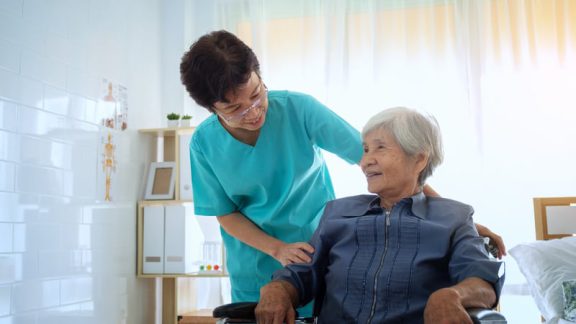If you’ve been your aging parent’s caregiver for a while, it can be an emotional decision to turn that responsibility over to an assisted living facility. And if you’re in a situation where you can’t visit your parent often, you may worry that they’re not getting the care they need. Whether it’s because of quarantine or stay-at-home orders – or because you live in another part of the state or the country – it’s tough to trust someone else with your parent’s care. Here are a few ways to monitor your parent’s safety and treatment and make sure they’re being cared for in assisted living.
Call Your Parent Often
Simple phone calls with your parent can help you assess the situation at the assisted living facility. Ask about their day and see whether they mention meals or other day-to-day events like bathing, taking medication, and attending recreational events. Take note of any mood changes or any comments that may suggest they’re not getting the care they need.
One of the most common complaints in assisted living and nursing homes is staff failing to answer a resident’s call for assistance. If your parent mentions that they’ve asked for help – maybe they have a call light to request assistance—but no one came, that’s a complaint to take seriously, and can mean that residents’ calls are being ignored.
Another common complaint is the general attitude of the staff. According to Amity Overall-Laib, director of the National Long-Term Care Ombudsman Resource Center, a common issue in assisted living is staff “not treating residents with dignity and respect and providing individualized care.” Ask your parent if they’re being treated well, if the staff is nice to them, or if they have a favorite nurse or other employee. A hesitation or an uncertain answer, even if they’re hedging because don’t want you to worry, might signal a problem. You can then call the facility administration with any concerns or issues (more about that later).
Use Technology to “Visit” Their Room
Consider using Apple’s FaceTime, Skype, Google Hangouts or another video chat program to make a video call. Make sure that your parent knows how to use this technology, or arrange with a neighbor, friend, or staff member to help them out with it. Use this time to check for any changes in your parent’s appearance or attitude. Sudden weight gain or loss could signal an issue with their care. Looking disheveled or unkempt, especially if they’ve always taken good care of themselves, could mean something is wrong, too.
Just like you’d visit at different times of the day, try to video call at different times of the day. That way you can see the state of their room. Does it seem tidy and clean? Are there dirty dishes or other clutter in the room? A messy living situation may indicate a lack of basic care for the facility’s residents. Using a video call to check in and finding your parent in clean surroundings can be very reassuring.
Communicate With the Staff
It’s important to establish a relationship with the staff in charge of your parent’s care. When you can visit, talk to them. When you can’t visit, email or call the facility. You can even set up a regular – weekly or biweekly – phone call to talk about how your parent is doing.
When you are able to visit your parent in person, consider chatting to other residents, too. If they seem happy and well cared for, there’s a good chance your parent is, too.
Hire a Geriatric Care Manager
If you don’t feel like you can truly assess the situation yourself, look into hiring a geriatric care manager. A geriatric care manager is a licensed nurse or social worker who will assess your parent’s living situation, make sure your family has a solid long-term care plan in place, and check in on your parent for you. They are experts on senior care, so they know what to look for in an assisted living facility – both good and bad – to ensure that your parent is well cared for. Hiring a professional will cost you money, though, and geriatric care managers, who usually charge by the hour, aren’t covered by insurance or Medicare.




